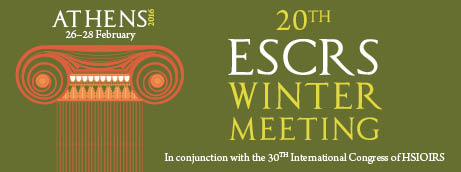Posters
(results will display both Free Papers & Poster)
Safety and efficacy of high-fluence collagen cross-linking (CXL) of the vehicle cornea in Boston Keratoprosthesis (KPro) type 1: long-term evaluation
Poster Details
First Author: G. Chatzilaou GREECE
Co Author(s): A. Kanellopoulos
Abstract Details
Purpose:
To evaluate safety, efficacy of CXL for achieving increased cornea rigidity and reduced enzymatic digestion in the vehicle cornea of Kpro 1.
Setting:
LaserVision.gr Clinical and Research Eye Institute, Athens, Greece
Methods:
Eleven consecutive Kpro cases (5 with previous repeat cornea graft failure, 4 with ocular cicatricial pemphigoid, and 2 with chemical burn) received donor-vehicle cornea pre-treatment with very high-fluence prophylactic cornea crosslinking in a two-step procedure. The donor cornea was cross-linked with intrastromal riboflavin instillation through a femtosecond-laser-created pocket, followed with a superficial CXL treatment. At the completion of pre-treatment, the cornea was trephined with femtosecond-laser and the keratoprosthesis was fitted onto the cross-linked donor. Visual acuity, corneal surface and donor vehicle cornea stability were evaluated. Follow-up evaluations were conducted over the next 9 years with a mean of 7.5 years.Mean uncorrected visual acuity improved from light-perception to 20/60. One case required follow-up surgery, due to significant melt in the host cornea. None of the eyes developed melts and/or infection, especially on the vehicle cornea on which the keratoprosthesis was fitted. Dual, superficial and intrastromal high-fluence cross-linking in Boston Keratoprosthesis type 1 cases was found to induce increased corneal rigidity and resistance to enzymatic degradation
Results:
Pre-treatment with intrastromal and superficial CXL in Boston Type 1 Kpro appears to be a safe and effective adjunctive treatment for increased vehicle donor cornea rigidity and potentially increased resistance to enzymatic degradation
Conclusions:
FINANCIAL DISCLOUSRE: NONE


